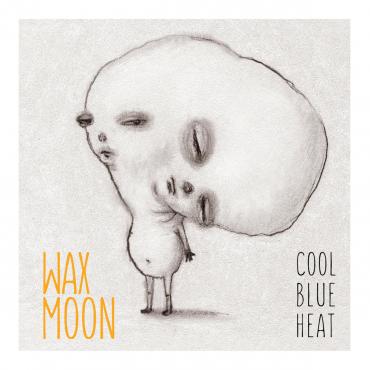Wax Moon’s Second EP is a Folk Paean To Love & Loss

Art, no matter if its endpoint is good or bad is born of emotion. Every doodle comes from somewhere inside; every finger pick, every word written down whether it is sung or read out loud or eventually crossed out in favor of something different, perhaps better, perhaps more direct. Even the things we discard while making art are still relevant stones, still breadcrumbs laid down to trace our path back to where the ideas originated. Even free-style or free verse is not made up on the spot, or pulled out of thin air. It comes from somewhere deep inside, the words just like sands suddenly pouring forth into the bottom of an overturned hourglass.
The San Francisco acoustic duo Wax Moon, Paul Kimball and John Blatchford, know this to be true I feel because it permeates the themes of love and loss on their second EP Cool Blue Heat which succeeds their debut Ready or Not, which had tackled the very same themes. Sadly the loss here was that of Paul Kimball’s wife who passed away after an undisclosed illness.
Cool Blue Heat was recorded live in the studio with no overdubs and the opening title track is both personal and haunting. The lyrical imagery is unlike I’ve ever heard before. The words are heartbreakingly poetic as Kimball laments “And now I understand these cutting girls / the tiny slices that burn so sweet / doses of medicine soberly applied / to pull out the poison /cool blue heat.” As if that’s not heartbreaking enough take the last verse of “My Future Crime” which goes “Today my love opened her ledger to me / and whispered the words “together, forever”/ I felt the man she believed me to be peeling away, pedal to metal.”
Here I thought of Shakespeare’s King Lear as far to the end as one can go. As there is literally no one left in King Lear it made for me “Always Here” that much more despondent, only so because it must, I can only imagine, have made Kimball feel as he wrote it. It is a road song, a running away song. Here he is lamenting on how no matter where he goes: be it Utah, Manhattan or Mecca, he cannot escape the loss of his wife.
Cool Blue Heat is both a record of heartbreak and of hope. It is an example of the beauty that can be born from loss. On a musical level the live aspect really draws out the raw power of loss which Cool Blue Heat was born from. I would never dare to speak for the loss of someone’s loved one whom I had never known, but I can say that Cool Blue Heat is a beautiful record and a stunning tribute that deserves a wider audience.


